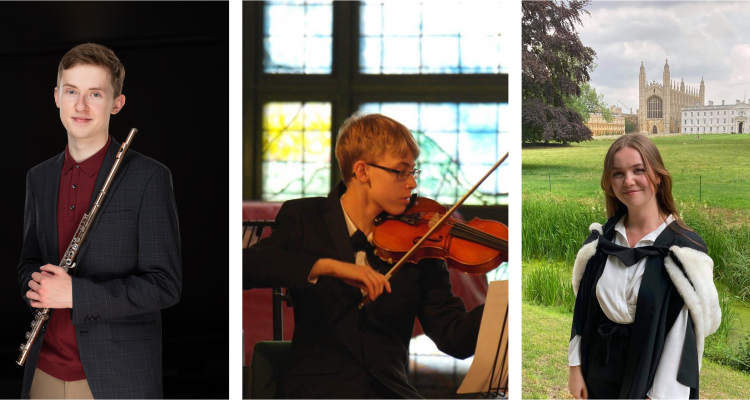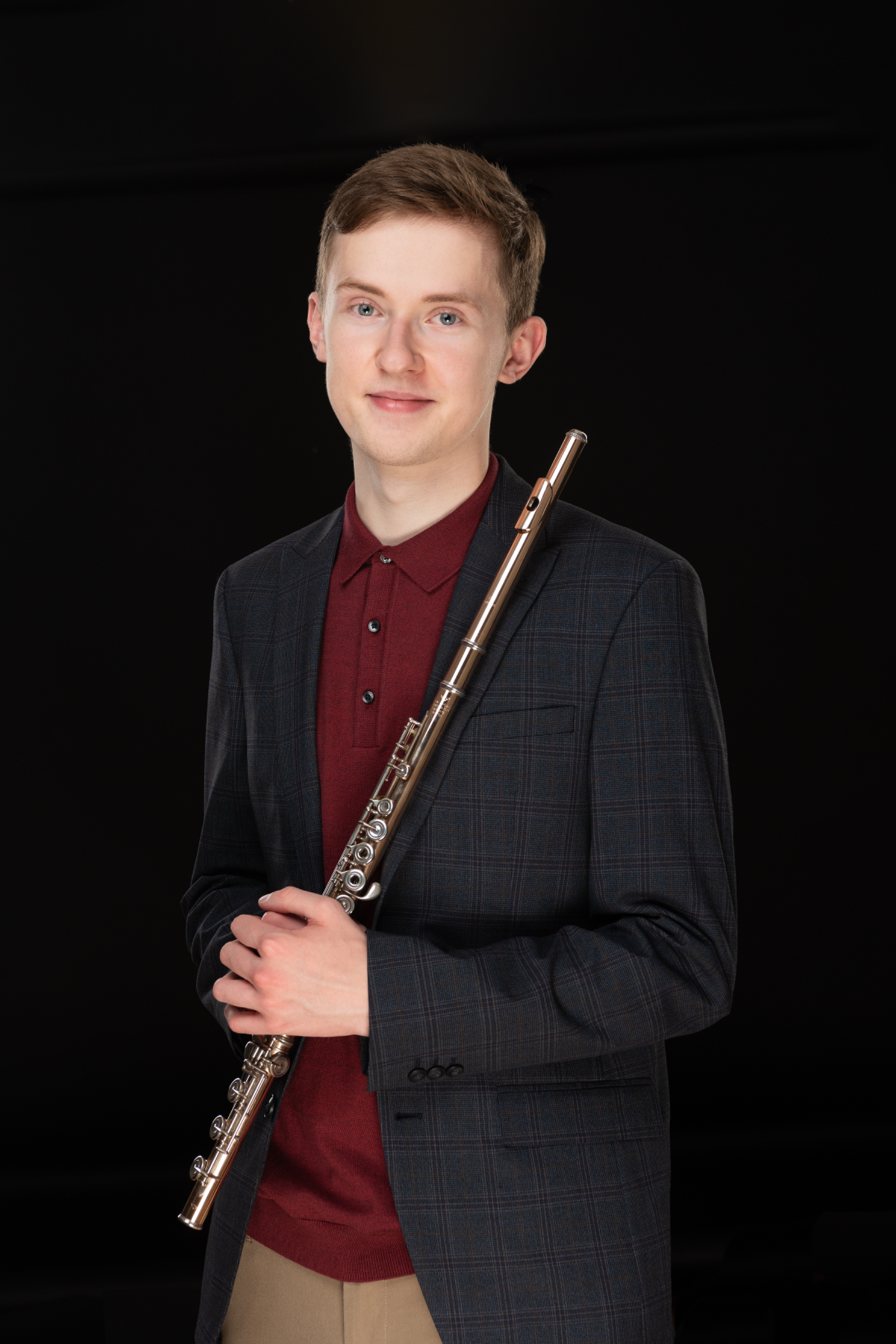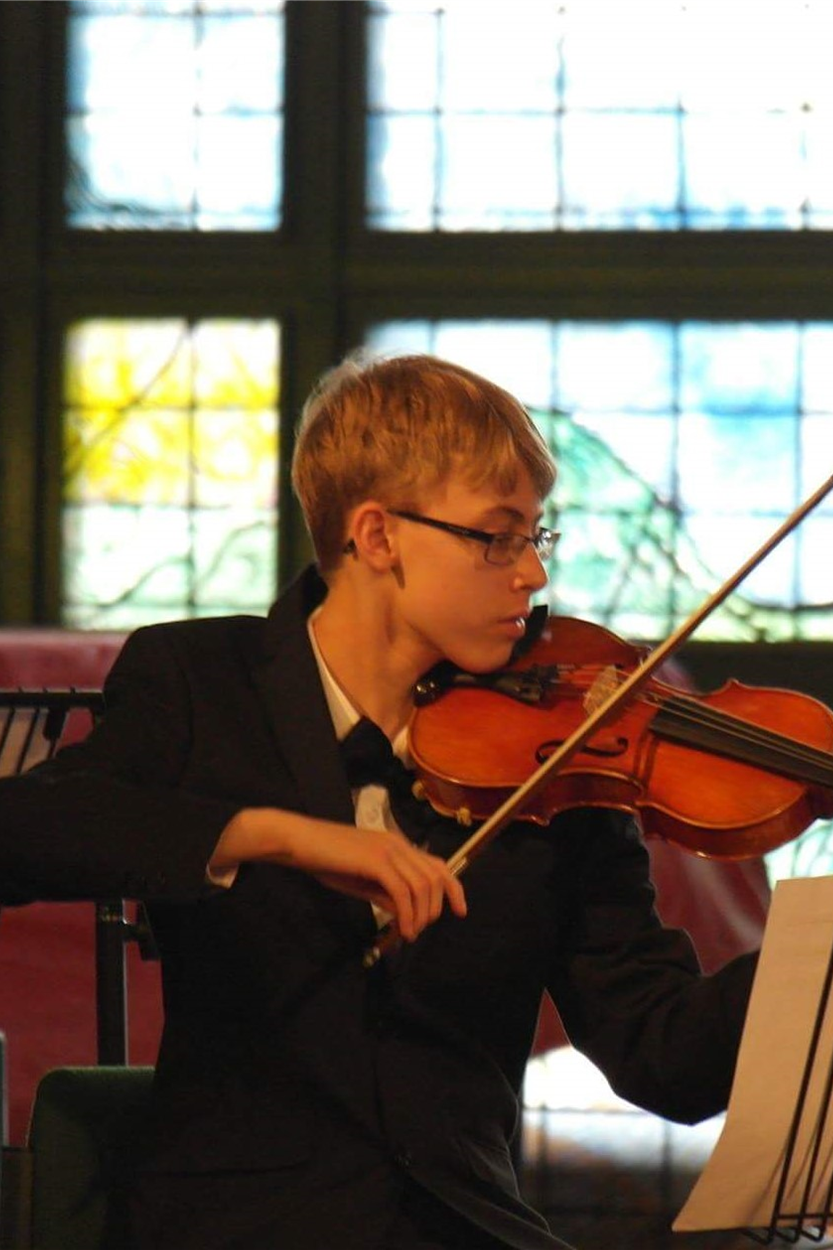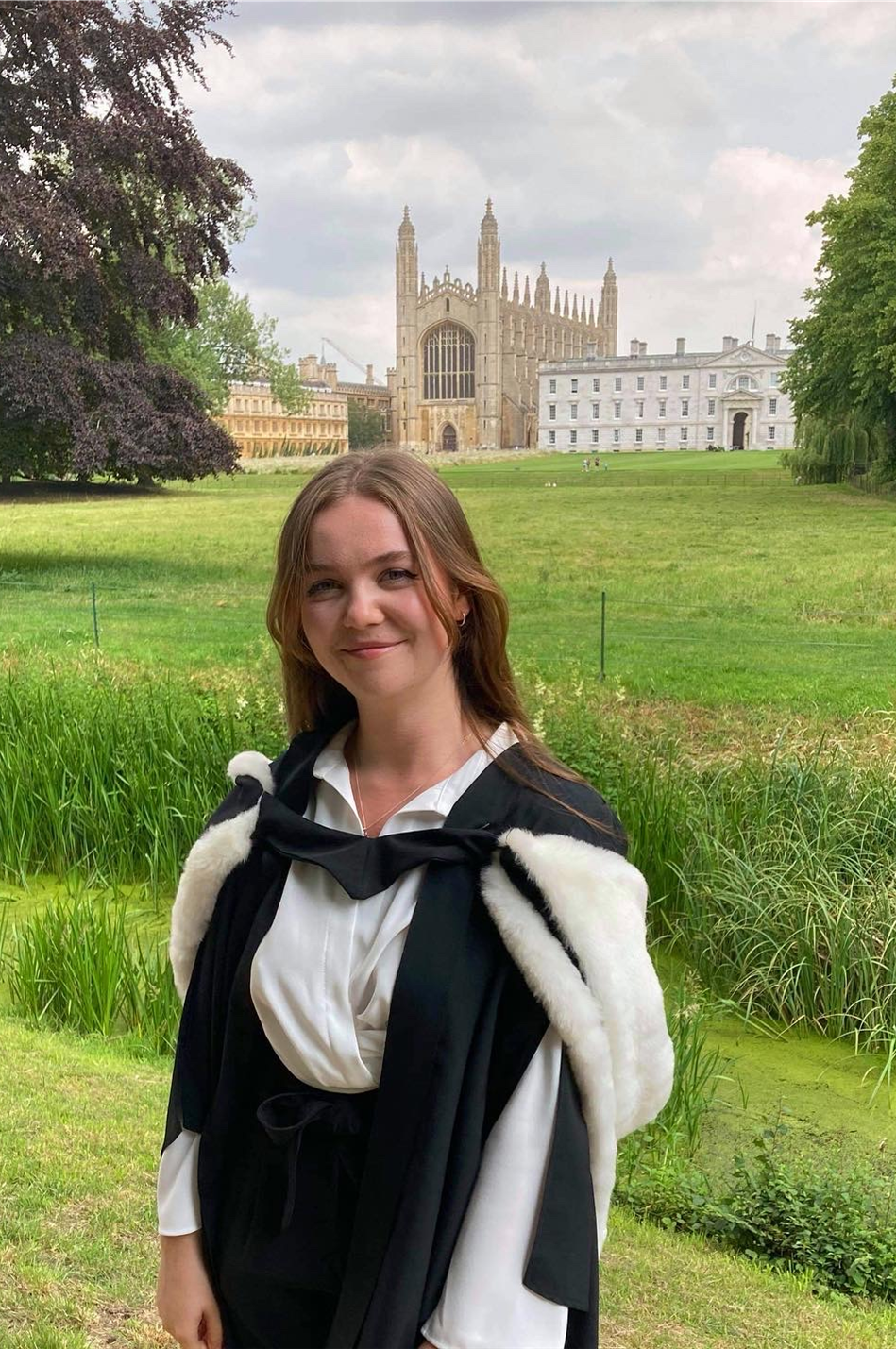Events
Roll of Alumni weekend Concert 2021

Programme
Two movements from Fantastiestücke, Op. 43 - Niels Gade (1817 – 1890)
Ballade; Allegro molto vivace
Madeleine Morris (clarinet)
Sam Rudd-Jones (piano)
Niels Gade is widely regarded as Denmark’s greatest composer of the mid-Romantic period. He taught and influenced several Scandinavian composers including Edvard Grieg, Carl Nielsen and Otto Malling. His music often exhibits the influence of Mendelssohn and Schumann, and the Fantasy Pieces, written and published in 1864, were probably inspired by Schumann’s Fantastiestücke, Op. 73 (1849). The Op. 43 collection, originally intended for either clarinet or violin, is one of Gade’s most popular, as demonstrated by various arrangements.
‘Jardins sous la pluie’ (from Estampes, L. 108) - Claude Debussy (1862 – 1918)
Louie McIver (piano)
‘Jardins sous la pluie’, the final movement of Debussy’s Estampes (1903), includes references to many types of music that would have been familiar to the composer. Quotations from popular songs can be heard, as well as semiquaver passages that reference the French keyboard tradition. The piece ends with a radiant E major section depicting a sunlit moment.
Syrinx - Claude Debussy (1862 – 1918)
Lloyd Hampton (flute)
As the first major solo work written for the flute in over 150 years, Debussy’s Syrinx (1913) is a landmark in the flute repertoire. It was written as part of the incidental music for Gabriel Mourey’s play Psyché. The title ‘Syrinx’ refers to both the Ancient Greek word for panpipes and a nymph from Greek mythology which is the inspiration for the work. Syrinx the nymph is pursued by the god Pan, and while trying to escape him, she seeks the help of water nymphs who turn her into a bundle of hollow reeds. Pan finds these reeds and cuts them up, creating the first set of panpipes.
‘Une barque sur l’océan’ (Miroirs) - Maurice Ravel (1875 – 1937)
Louie McIver (piano)
‘Une barque sur l’océan’ is taken from a suite of piano compositions written in 1905. In this piece, Ravel makes extensive use of arpeggios, creating a vivid sonic landscape.
Intermezzo in A major, Op. 118 No. 2 - Johannes Brahms (1833 – 1897)
Madeleine Morris (piano)
The six Klavierstücke, Op. 118, are some of Brahms’s most beloved piano works. Completed during a summer holiday in Bad Ischl in 1893, the collection is one of the last compositions published during Brahms’s lifetime. It is also his penultimate opus for piano solo. The late piano works tend to be more introspective than Brahms’s earlier pieces for piano, which are often virtuosic in character, and the Intermezzo is surely the most melodious of the Op. 118 set.
Fantasy on ‘Der Freischütz’ - Paul Taffanel (1844 – 1908)
Lloyd Hampton (flute)
Ellis Thomas (piano)
A highly successful performer and conductor as well as a professor at the Paris Conservatoire, Paul Taffanel was responsible for founding the modern French school of flute playing. His Fantasy on ‘Der Freischütz’ is based on three themes from Carl Maria von Weber’s landmark Romantic opera. The operatic fantasy grew rapidly in popularity during the nineteenth century, as it allowed for virtuosity (in this instance exploiting the technical and expressive capabilities of the recently invented Boehm system flute) while engaging audiences with melodies drawn from well-known operas.
Musing - Louie McIver (b. 2000)
Louie McIver (piano)
My piece Musing (2021) opens with four chords that form the basis of the rest of the work. For this composition, I wanted to create a spiritual atmosphere by exploring these chords’ specific colours, especially through harmonic and melodic means.
Kevätyö - Selim Palmgren (1878 – 1951)
Madeleine Morris (piano)
Selim Palmgren was a Finnish contemporary of Sibelius. He studied piano and composition at the Helsinki Conservatory from 1895 to 1899. From 1936 until his death, Palmgren was professor of harmony and composition at the Sibelius Academy in Helsinki. His compositions include five piano concertos, over 200 songs, and nearly 300 lyric pieces. Kevätyö, which translates as ’spring night’, is a powerfully haunting piece that uses a rich late-Romantic harmonic palette and conjures the celestial, eerie atmosphere of dusk during springtime.
Two movements from Suite: Portraits of Langston (2007) - Valerie Coleman (b. 1970)
‘Jazz Band in a Parisian Cabaret’ ; ‘Harlem’s Summer Night’
Lloyd Hampton (flute)
Madeleine Morris (clarinet)
Louie McIver (clarinet)
Valerie Coleman, described by The Washington Post as one of the ‘Top 35 Female Composers in Classical Music’, is a composer, flautist and educator. Portraits of Langston, a six-movement work based on Langston Hughes poems inspired by New York and Paris, features an optional role for a narrator who reads the relevant Hughes poem as an introduction to each movement. The work incorporates a range of musical styles including stride piano technique, big-band swing, cabaret music, mambo, African drumming and traditional spirituals.
POEMS BY LANGSTON HUGHES
Jazz Band in a Parisian Cabaret
Play that thing,
Jazz band!
Play it for the lords and ladies,
For the dukes and counts,
For the whores and gigolos,
For the American millionaires,
And the school teachers
Out for a spree.
Play it,
Jazz band!
You know that tune
That laughs and cries at the same time.
You know it.
May I?
Mais oui.
Mein Gott!
Parece una rumba.
Play it, jazz band!
You've got seven languages to speak in
And then some,
Even if you do come from Georgia.
Can I go home wid yuh, sweetie?
Summer Night
The sounds
Of the Harlem night
Drop one by one into stillness.
The last player-piano is closed.
The last victrola ceases with the
‘Jazz Boy Blues’.
Biographies
Lloyd Hampton (2018 Music)
 Lloyd has just begun an MMus at the Royal Academy of Music. At Cambridge he studied flute with Emma Halnan and held a University Instrumental Award and a Daphne Bird Instrumental Award; he also won the LGA Music Award. Much in demand as solo, chamber and orchestral flautist, Lloyd was principal flute in the Cambridge University Orchestra, winning a ‘Highly Commended’ in the 2020 CUMS Concerto Competition. Before Cambridge, Lloyd studied for seven years at the Junior RNCM, where he received a prize for academic studies. He is an alumnus of the NYO and has performed in masterclasses with several eminent flautists including Sir James Galway. Lloyd is grateful for the generous support of the Charlotte Fraser Foundation and Talent Unlimited.
Lloyd has just begun an MMus at the Royal Academy of Music. At Cambridge he studied flute with Emma Halnan and held a University Instrumental Award and a Daphne Bird Instrumental Award; he also won the LGA Music Award. Much in demand as solo, chamber and orchestral flautist, Lloyd was principal flute in the Cambridge University Orchestra, winning a ‘Highly Commended’ in the 2020 CUMS Concerto Competition. Before Cambridge, Lloyd studied for seven years at the Junior RNCM, where he received a prize for academic studies. He is an alumnus of the NYO and has performed in masterclasses with several eminent flautists including Sir James Galway. Lloyd is grateful for the generous support of the Charlotte Fraser Foundation and Talent Unlimited.
Louie McIver (2018 Music)
 Louie was born in Wrexham, North Wales, in 2000. He started piano lessons at the age of five and, a few years later, began studies in violin and composition. Before coming to Cambridge, he was taught piano by John Gough of Chester, winning competitions in the Chester, Wirral and Alderley Edge Music Festivals. During this time, he also passed his piano diploma with distinction. He now studies piano with Matthew Schellhorn (1995). In 2013, Louie won the Junior Category of the BBC Proms Inspire Young Composers’ Competition and subsequently received a BBC commission. He has been composing ever since.
Louie was born in Wrexham, North Wales, in 2000. He started piano lessons at the age of five and, a few years later, began studies in violin and composition. Before coming to Cambridge, he was taught piano by John Gough of Chester, winning competitions in the Chester, Wirral and Alderley Edge Music Festivals. During this time, he also passed his piano diploma with distinction. He now studies piano with Matthew Schellhorn (1995). In 2013, Louie won the Junior Category of the BBC Proms Inspire Young Composers’ Competition and subsequently received a BBC commission. He has been composing ever since.
Madeleine Morris (2018 Music)
 Maddy has just graduated from the University of Cambridge after studying Music for three years at Girton College. During her time in Cambridge, she held a Jill Vlasto Choral Scholarship, a Daphne Bird Instrumental Award, the College Music Scholarship and a University Instrumental Award. She was the principal clarinettist of Cambridge University Orchestra for two years, and a member of Girton College Chapel Choir for the duration of her time in Cambridge. Maddy is beginning an MPhil in Musicology at the University of Oxford this October, researching potential sonic interventions for sleep therapy. She is the recipient of Keble College’s Graduate Choral Award.
Maddy has just graduated from the University of Cambridge after studying Music for three years at Girton College. During her time in Cambridge, she held a Jill Vlasto Choral Scholarship, a Daphne Bird Instrumental Award, the College Music Scholarship and a University Instrumental Award. She was the principal clarinettist of Cambridge University Orchestra for two years, and a member of Girton College Chapel Choir for the duration of her time in Cambridge. Maddy is beginning an MPhil in Musicology at the University of Oxford this October, researching potential sonic interventions for sleep therapy. She is the recipient of Keble College’s Graduate Choral Award.
